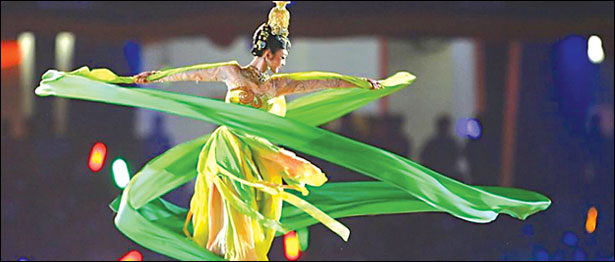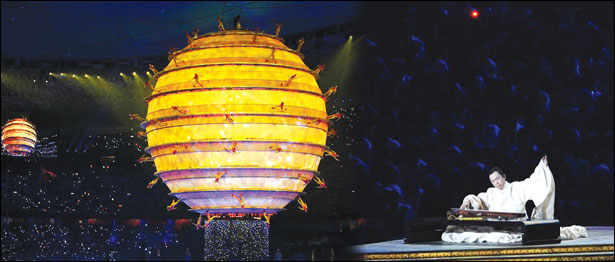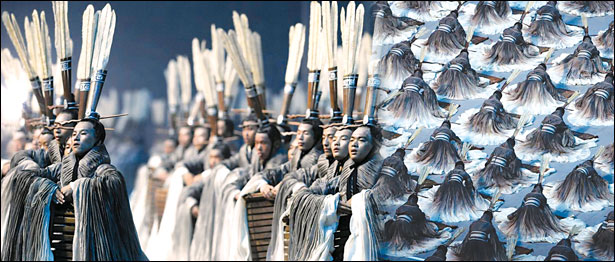|
|
| |
instep
comment
How to make the homeland shine 101
Lessons we can learn from China after the opening ceremony of
the Beijing Olympics
As Beijing welcomed the world to the opening of the prestigious
Olympics ceremony, it proved once again why the East matters. And
here's why Pakistan needs to learn from its neighbour
By Maheen
Sabeeh |
| |
 |
| |
When
the Olympics first began in 1896, no Asian country was invited.
Flash forward to 2008, an Asian country, China, stunned the world.
On August 8, 2008 as Beijing welcomed the world to the opening of
the prestigious Olympics ceremony, it proved once again why East matters.
With Chinese filmmaker Zhang Yimou (director of films like Hero and
House of Flying Daggers) at the helm of production, the opening ceremony
included 4000 years of Chinese history and tradition, all compacted
in 50 minutes.
It included the achievements of the Chinese people, of inventions
like gun powder, papermaking, printing and the compass, the vibrant
and richly choreographed night featured everything from the Great
Wall of China to astronauts, pianists, children, opera puppets and
more.
2000 drummers pounded hypnotic beats, dancers performed exquisite
steps, 29,000 fireworks lit up the gorgeous skyline, papermaking was
shown in unique manner as paintings were projected onto a huge canvas
and actors wrote out Chinese characters with their twisting, ink-laden
bodies in whimsical movements.
It was China's night. The entire ceremony fell into place with such
precision and the Chinese performed moved in such grace that they
included everyone who was watching, whether at the event itself, or
on their television screens. They moved so beautifully that one was
mesmerized.
Olympics are indeed about sports but that night was about the rich
culture of China and its people.
It was as if China had been preparing for this moment of glory since
its inception.
And this nation, surprisingly, came into its own independence two
years after Pakistan. It was in 1949 when the People Republic of China
arrived on the map, not long after Pakistan.
And yet we've fallen behind China. Forget the technological advancements
but just the difference between their representation of arts and ours
is in itself to make one envious and disappointed. |
| |
 |
| |
For instance, Asim Yar Tiwana, based in Islamabad, has managed to
land some of the most prolific events such as the one held in honour
of American President George Bush at the Presidency, the Taj Mahal
premiere in Lahore as well as shows taking Pakistan abroad like Kuala
Lumpur, Malaysia and Dubai in recent times.
Reputed fashion critics argue that neither does he gave fair representation
to fashion nor does he do justice to the traditional arts of Pakistan
and quite often manages to create a "variety" show.
This fact was confirmed when Nomi Ansari commented on the KL show
by Asim Yar Tiwana (while speaking with Instep): "Asim's shows
are cheap and tacky. They are more about tableaus and qawwalis than
appreciating or promoting fashion. You see the drama, you see the
girls but you just don't see the clothes. The show I did with him
was the worst show of my career."
HSY generously commented that he had "seen worse shows in his
life".
Why doesn't the government of Pakistan opt for people who are more
credible?
These cultural shows are one example. Pakistan needs representation
the way Pakistan Day Parade was held in London last July. And every
event should be done with such style. It's a country that is being
represented, a country of millions of people.
Then there are the gifted writers and poets long forgotten.
How are our writers and poets remembered? Do we know where Faiz Ahmed
Faiz, Saadat Hasan Manto, Baba Bulley Shah or Habib Jalib are buried?
Why are there no monuments for these men? |
| |
 |
| |
Take a turn around the world. Take London for instance. Westminster
Abbey has an entire poet's corner. Britain's most distinguished
poets, Tennyson, Browning, Dryden are buried there.
Others who are not buried at Westminster Abbey have received at
least a memorial there, and they include Shakespeare and Milton
as well as poets like Blake, Keats, Shelley, Wordsworth, and Burns.
And then there are the giants of the 20th century like TS Eliot
and WH Auden, and Laureate John Betjeman.
Poets' Corner also includes not just poets but all sorts of writers
who are buried there. Charles Dickens reportedly gets a fresh wreath
on his death anniversary every year. One will find monuments for
Hardy, Jane Austen, and the Brontes among countless others.
If there are monuments anywhere hidden away in Pakistan, has the
government made efforts to shed light on them?
In the last few years, media has boomed and the music industry has
thrived. Till his resignation, musicians continued to support the
regime of President Pervez Musharraf because he was a liberal man.
Indeed he was.
But giving media freedom is one thing, giving the music industry
support is another. And when one speaks of support, it means more
than attending concerts or inviting musicians to perform on August
14.
It means making sure that men like Ustaad Hussain Bux Gullo, Ustaad
Naseeruddin Sami and Mehdi Hasan do not end up like Pathanay Khan.
It goes way beyond handing artists Presidential Awards.
"Do you realize how old some of our artists are? They are our
real heroes, some of whom are still living in dire conditions. They
are renowned world over for their performances but here there is
not even a proper record of our great musicians," commented
music producer Faisal Rafi to Instep while speaking about our classical
greats.
Music producers Faisal Rafi and Shahi Hasan are recording tracks
with a variety of classical musicians under the Indus World Project
but the funding hasn't come from the government. Although it should
have.
Music critics grill popular commercial musicians for selling out.
Ali Azmat remains at the brunt of this criticism because he is a
rock icon and he shouldn't sell out. In other words, an endorsement
like McDonalds is beneath him. But considering the lack of support,
why shouldn't he sell burgers if it means he can make millions and
invest it in his music, videos and his life?
Pick any section from the arts, whether fashion - which governments
worldwide facilitate but ours doesn't because they can't possibly
understand how designers can uplift Pakistan's image - or the film
industry, that was allowed to rot in isolation for so long that
we hardly had any cinema culture left till Khuda Kay Liye came along
or the music industry that is in the doldrums. Our pop artists are
flourishing thanks to corporate sponsorship while senior classical
and folk musicians live in poverty. This lack of support is disappointing.
A country is always represented by its art.
If one looks at sports, the situation is somewhat similar. The plight
of Pakistan Cricket for the last year or so, lack of discipline,
personal egos, lack of training - or look at the lack of support
for football, which is the game of the masses at the grassroots
level, it is all crumbling downwards. There is no proper system
in place. In India, Bollywood has been granted "industry"
status and right now Shah Rukh Khan is in talks with Indian government
to exempt films from entertainment tax.
Pakistan is the land of the pure. It has four regional languages
and provinces, each with a unique set of traditions, history and
backgrounds.
Not only do we need to preserve but also a platform for it to survive.
What China pulled off at the opening ceremony was not done overnight.
It has managed to retain its historical traditions and it is time
Pakistan learns from its neighbors. |
|
|

